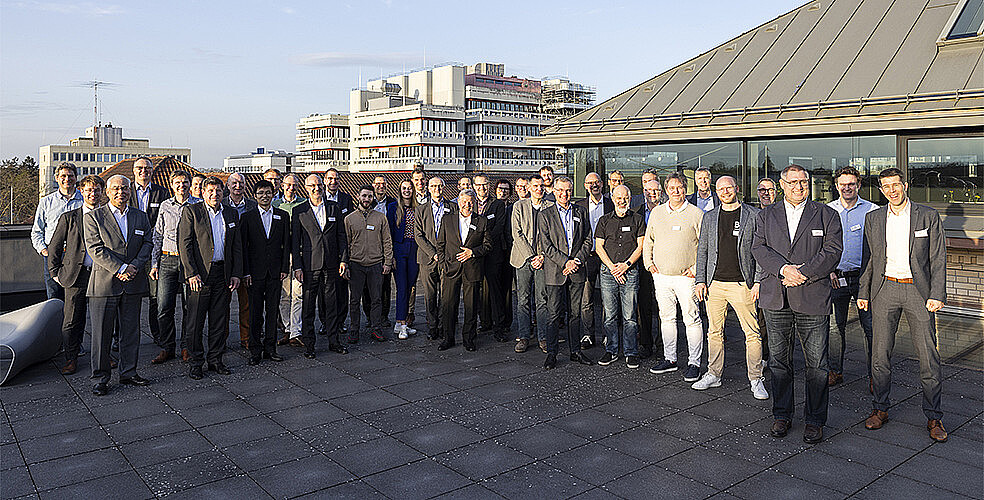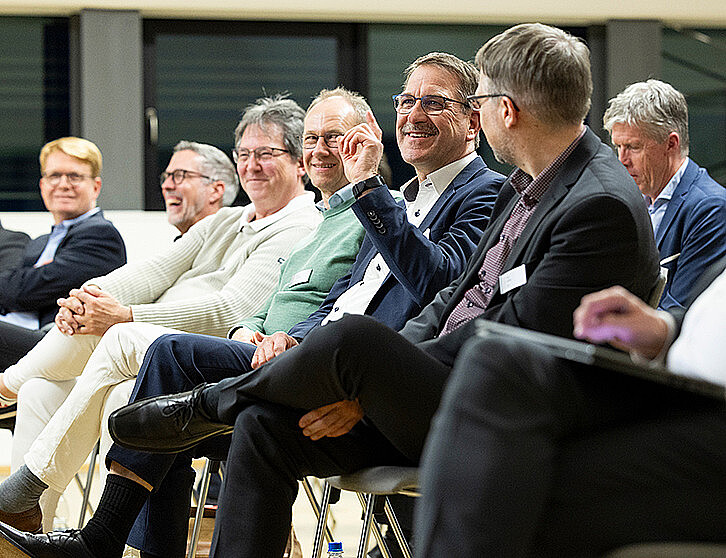Published on April 15, 2024
Building bridges between start-ups and established companies: Fireside Evening at the KIT Business Club

On March 26, 2024, the KIT Business Club invited its member companies to a fireside evening. The topic of the evening: the bridge between start-ups and established companies. Over 45 guests from 22 companies and representatives of three start-ups from KIT accepted the invitation to gain mutual insights and discuss expectations and challenges at this interface.
The program offered a variety of interesting impulses. Professor Thomas Hirth, Vice President Transfer and International Affairs at KIT, opened the evening with current topics and a plea for entrepreneurship at KIT, including insights into the importance and scope of start-up projects. Three KIT spin-offs followed with inspiring contributions about their experiences to date from a start-up perspective. They showed how collaboration with corporates can work. Among them was Lisa Raab from Spotium, who gave insights into her work on a market and sales intelligence platform for mechanical engineering. Dr. Martin Hohberg, Managing Director of Simutence, impressed the audience with his approaches to smart engineering with fibre composites and, last but not least, Dr. Maximilian Hochstein from Formic presented his solution in the field of swarm transport modules. Exciting perspectives "from the other side" emerged from the contributions of two company representatives: Dr. Mathias Glasmacher from Diehl Stiftung & Co. KG and Dr. Felix Nissen from Evonik Industries AG contributed their experiences and views on cooperation with young spin-offs to the discussion.

In a familiar atmosphere, the guests then had the opportunity to discuss points of contact and ideas in depth. Many interesting discussions were held, for example about the pricing and business models of the spin-offs. At the end of the evening, some important "lessons learned" emerged for the collaboration as a whole: both sides can benefit from a collaboration despite – or precisely because of – the different working methods and corporate cultures. Start-ups bring creativity and new approaches to companies, while conversely they are better equipped to deal with crises due to the financial security of established companies. From the start-ups' point of view, however, it became clear that short distances to people with decision-making authority and fast decision-making processes are often essential for survival. This is precisely what often poses a challenge for larger organizations. Companies can counteract this by establishing a strategic roadmap and clear processes for cooperation with spin-offs. On the one hand, this naturally includes content and technical matching as well as the evaluation of joint potential. On the other hand, according to the speakers, projects are particularly successful when cooperation takes place on an equal footing and intensive time and technical support is also possible on the corporate side.
Representatives from both sides also discussed another essential aspect: the importance of contacts and networks for new impulses and stability. The fireside evening of the KIT Business Club once again made an important contribution to this. The inspiring, insightful evening was able to focus on success factors relating to cooperation between young start-ups and established companies and lay the foundations for new collaborations and promising partnerships.

comments about this article
No Comments